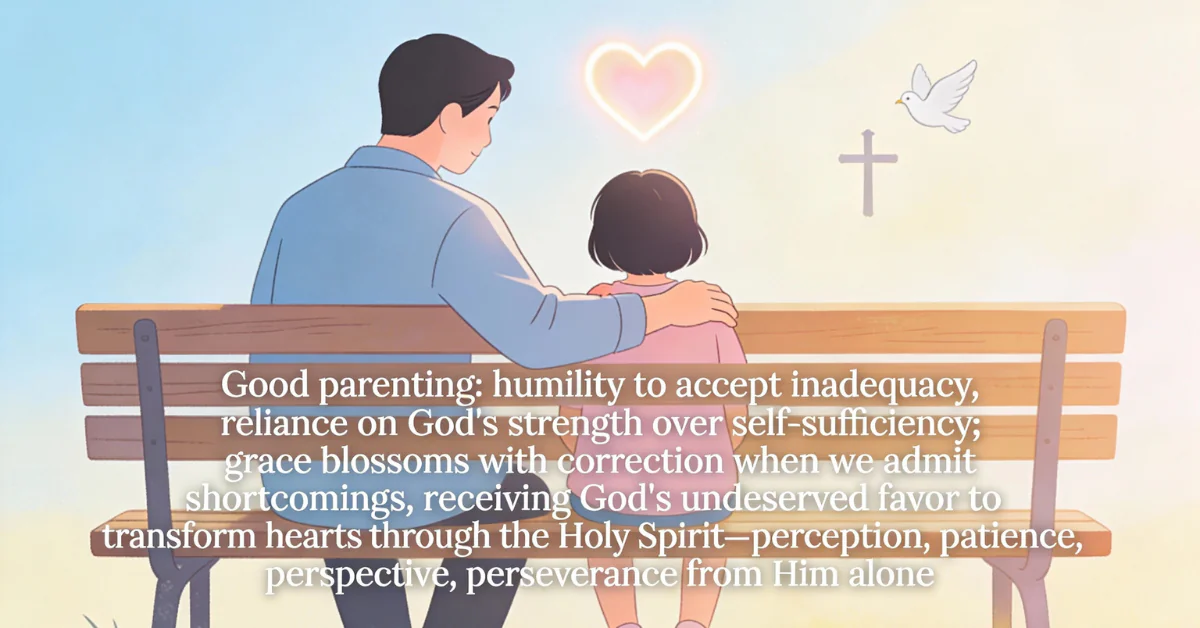Parent with Grace. Somewhere between permissive approaches that let anything happen and hard-hearted discipline lies what good parenting actually requires: a willingness to accept that you’re inadequate and need God’s strength rather than self-sufficiency.
Parents must understand that grace isn’t the opposite of correction; it blossoms when we admit our parenting shortcomings and become recipients of God’s undeserved favour, which then flows through us as instruments of His grace toward our children.
This involves humbly receiving what we cannot achieve, the power of the Holy Spirit to transform both our hearts and our child’s heart because none of us can parent adequately through human wisdom or self-righteousness alone, and must rely on Him to give us the perception, patience, perspective, and perseverance that only God provides when we ask for help.
What Grace Isn’t / Applying Grace as a Parent
Grace-based parenting doesn’t mean we dismiss God’s Law or abandon consistent discipline; that’s a dangerous pendulum swing toward permissiveness that embitters the heart of a child. Many parents mistakenly believe showing grace requires eliminating consequences or avoiding correction, as if sin isn’t a serious offense requiring the cross and death of the Messiah.
Must remember: coercive parenting approaches that bark orders and tongue-lash children create condemnation rather than freedom, while abandoning rightful discipline denies them the knowledge of sin they need. Must embrace that effective parenting acknowledges that breaking God’s Law is a horrible thing, yet approaches weakness through patient, loving instruction rather than self-righteously screaming or slamming doors in anger.

Embracing Grace
Before parents can become effective instruments of grace in their children’s lives, they must first acknowledge their own desperate need for Christ and freely receive what God extends. The reality is that self-assurance stands as one of the biggest hindrances to good parenting. Parent with Grace.
When we refuse to admit that our thoughts and actions don’t align with God’s plans and purposes, we close ourselves off from the very grace that could heal and transform us. Ask God for what you cannot manufacture yourself, recognizing that you are worthy not because of anything you have done or not done, but because God unreservedly loves you and wants to help you navigate every parenting moment.
This grace isn’t merely sufficient for your child; it’s for you too, and you must ask for it with the humility found in Hebrews 4:16, understanding that if you don’t ask, you will not receive it. What many new parents fail to grasp is that God’s grace serves as the Source that rescues you from self-centeredness and opens your heart to His transforming mercy, allowing you to step out from under impossible standards and condemnation into the freedom of being sanctified that space between what was and what will be.
Requesting Grace
Many parents fail to recognize that their inadequacies become the very reason they must actively seek God’s grace rather than attempt parenting through independent strength alone.
When dealing with challenging moments where anger or disappointment rises, the wisest response involves confessing our need for divine help before disciplining our children, a practice that transforms correction from mere punishment into an opportunity for modeling dependence on Jesus.
This approach requires understanding that self-motivated efforts to be perfect human guardians will always fall short of the mark, yet through prayerfully asking Him to pour His love and tender heart into our daily struggles, we must become instruments through which Christ-like compassion flows, even when we feel our kids don’t deserve it.

Windows for Grace / Perceiving Sin as Possibility
Parent with Grace. When sin surfaces in children, many Parents miss the profound truth that these moments aren’t disruptions but divine appointments where God orchestrates transformation. Each infraction becomes a wonderful tool for teaching about confession, seeking help, and understanding how weakness positions us to receive what we cannot manufacture independently-minded.
Rather than pushing toward mere compliant behavior, these instances restore the relationship through conversations that show how divine grace operates; you’re not meant to be something artificial but a conduit for truth. Every failure your child encounters must point them toward knowledge that change isn’t achieved through threats but through receiving unearned mercy.
The heart of the matter reveals itself: you can’t give what you haven’t internalized, so marinating in Deuteronomy 11:18 while being filled with the Holy Spirit (per Ephesians 3:16-17) must precede effective Parenting otherwise, you’re an empty image trying to dispense what you lack, which always fails because authentic grace flows from hearts genuinely changed by Grace.
Using God’s Law to Extend Grace
Parent with Grace. God’s Law must serve as more than a set of rules or a set of punishments; it must become a tool exposing our exposed need for rescue. When your eyes see a sin unfold, recognize it’s never an interruption, never an accident, or never a hassle; rather, it’s a moment where God is already working in your child’s heart.
The Christian life isn’t about demanding why they failed, it’s about calm inquiry: “What was going on in your heart?” This gospel preaching approach must transform every time you question behavior, asking, “How can I be part of what He is doing in this moment?” When your ears hear defiance or your eyes witness offense, remember He knows what’s needed and wouldn’thaveyou deal with this unless He wants you to hear something deeper.
Move toward your child, saying, “What are all the things He might accomplish here?” rather than rushing to punish. Their sin this way reveals weaknesses and attitudes that came naturally, yet because He loves them, He’s seeing (and wants you seeing) the done and wrong so You can confess together, knowing he won’t turn away. Picture yourself going down a hallway, thinking, “I want to give my child ears to hear and eyes to see greater knowledge of their heart, not just condemnation.” Their failure made you aware, but their sin is not just about offense,e it’s about cultivating greater knowledge of how He rescues you and them.
What Really Matters / Extending Grace
When Israel was redeemed from captivity in Egypt, the Law wasn’t given to achieve salvation; God had already loved them and placed His favor upon them first. His Law, actually a tool of grace, was given so they could thrive, and to remember that He wanted them to flourish, not flounder. When I lovingly enforce boundaries in my house, the Law gives knowledge of sin not as condemnation but as clarity. There’s something very different about a kid leaving their room with hands full of understanding versus walking away confused about anything they did wrong. You must recognize that correction itself must become an act of tenderness, not tyranny.
FAQs
Q: How can a parent with grace navigate daily irritations and interruptions when feeling impatient with their children?
A: Remember that Parent with Grace is freely given, not earned. Most situations requiring a change of heart become opportunities for grace rather than battles to win every time.
Q: What does it mean when we say grace isn’t just a style or technique but something we must live by?
A: A parent with grace understands they’re an instrument of transformation, not the source of change; they commit to nurturing rather than shaming, knowing God’s work of grace is progressive and takes 10,000 more moments before real insight into the heart begins to grow.
Q: Why do parents often struggle to give grace when their expectations aren’t met?
A: Admittedly, giving is easier said than done when we focus on what children deserve, yet Proverbs 4:23 reminds us to guard our hearts since everything you do flows from it, and without nurturing our own hearts through God, we deliver correction with a hard heart instead of kindness.
Q: How does understanding that transformation doesn’t happen overnight help a parent with grace during stressful seasons?
A: When you know real work of transformation happens step-by-step through faithful proceeding rather than achieving a problem-free, predictable outcome, you don’t have to carry the burden of being perfect. Watchfor how God works over the years as knowledge of right and wrong gradually sets in alongside love for authority.
Q: What gifts does grace offer when parents confess they’ve made mistakes or have regrets about things said or things done?
A: Grace provides fresh starts and new beginnings without shame or blame it’s the greatest gift that makes unknowns manageable and allows parents to selflessly share forgiveness, rescue their children from failures, and be a channel of thoughtfulness rather than someone who must live up to impossible standards while teaching their Son or daughter that love means being loved by God even while we’re imperfect (2 Corinthians 12:9).

